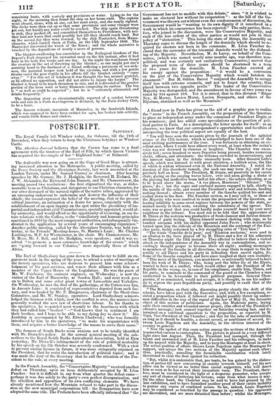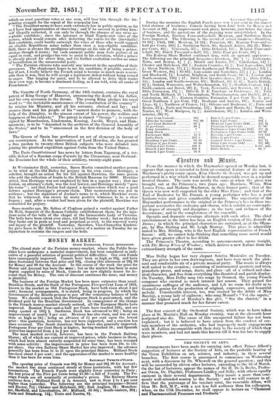In the French Assembly, the "Conservative Majority" received another defeat
on Thursday, upon an issue deliberately accepted by M. Leon Faucher : but it is difficult to say from what quarter the defeat came— perhaps it was due solely to the party's own perfect disorganization, and the rebellion and opposition of its own conflicting elements. We have already mentioned how the Mountain refused to take part in the discus- sion on the new municipal corporations bill : the Bonapartists have now adopted the same role, The Prefects have been officially informed that "the Government has not to meddle with this debate," since " it is wished to make an electoral law without its cooperation" : as the bill of the Go- vernment was thrown out without even the condescension of discussion, the Government would be " wanting to its own dignity if it interfered in a work in which its concurrence has been rejected. The only parties, there- fore, who joined in the discussion, were the Conservative Majority, and such of the less ardent of the other parties as would not join in their policy of "abstention." This being the state of things, the Assembly on Thursday came to discuss the length of the domicile which should be re- quired for electors not born in the commune. M. Leon Faucher de- clared that the surrender of the triennial domicile would be the disband- ing of the Majority. Nevertheless, M. de Leroy, on behalf of the Com- mittee, (which was named nearly nine months ago, was therefore non- political, and was certainly not exclusively Conservative,) moved that the proposed term of three years should be shortened to a term of two years for the domicile. K. Leon Faucher exerted all his energy against the proposition : " it would be a concession on the part of the Conservative Majority which would betoken its abasement." But M. Odilon Barret conjured the Assembly to occupy itself less with extreme counsels, and not to forget the country, thus placed between two opposite perils." The leader of the Conservative Majority was disregarded, and the amendment in favour of two years was voted by 344 against 218. Yet it is stated, that in this division "Edgar Ney, de Morny, Lucien Murat, Lucien Bonaparte, and others of the Elyseans, abstained as well as the Mountain."
A friend now in Paris has given us the aid of a graphic pen to realize the "scene" in the French Assembly, on the proposition of the Questors to place an independent army under the command of President Dupin or his nominees ; and has added some speculations on the position of poli- tical parties in Paris. As a description, the letter speaks for itself : as an observer, we know that our correspondent's opportunities and faculties of interpreting the true political aspect are equally of the best.
"You will have seen the accounts given by the journals of the agitated at'ance of the 17th instant, which is acknowledged to have been one of the most exciting performances of the year. I was fortunate in obtaining an ex- cellent seat, where I could hear almost every word, at least when the orator's voice was not drowned in clamour or laughter. The Chamber was exces- sively foil ; seven hundred or more Deputies being present, besides numerous cleiacs officers, and attendants : the tribunes crowded to inconvenience, and the hiterest taken in the debate unusually keen. After General Leflo's speech, which was listened to with great attention, a hubbub arose, the like of which is seldom witnessed even in the National Assembly. I noted the duration of this disorderly tumult, (for such one may term it,) and it was precisely half an hour. The President, M.Dupin, sat passively in his curule chair, gazing on the surging waves below, ever and anon giving a shake of the piercing. but ineffective brass bell at his elbow ; the ushers shouting, so as to be heard above the storm, 'A vos places, Messieurs!' ' Silence !" En places,' &c. ; but the eager and confused masses engaged in talk, chiefly in the middle of the salle, and round the President's seat and tribune, heeding nothing thereof; almost every member of the Gauche quitted his seat and rushed down to the floor. The Faucher section, as I may call it, or those of the Majority who were resolved to resist the proposition of the Questors, as leading infallibly to some overt rupture between the powers of the state, re- mained mostly in their seats, awaiting the subsidence of the uproar. The noise was so great that you could hardly make yourself heard by your next neighbour in the tribune. You need not to be told that the appearance of M. Thiess at the rostrunywas.productive of fresh clamour and furious demon- strations of party feeling. Thiess himself seemed choking with rage, as he bandied sarcasms with his skilful opponent Jules Favre ; who dexterously turned upon him the ridicule of the Mountain and the contempt of the Fau- cher party, feebly redeemed by a few straggling cries of 'Tres bien !' "The words 'Comedic de la peur,' and Reunion nocturne,' were used in an allusion to the farce played off by M. Thiers and a few of his adherents on Thursday night the 13th instant. They affected to believe that a violent attack on the independence of the Assembly WEIS' ill contemplation, and ac- cordingly thought proper to bivouac there all night; sending messengers to members of the Gauche in all directions, to urge them to repair to the As- sembly to aid Thiess and his party in defending their sacred rights, &c. Some of the Gauche complied, and have since laughed at their own credulity.
"This move of the Questors, you must know, is universally believed to have been the work of M. Thiers; who, being now the bitter foe of the Elysee, wanted to force on a conflict, which would either put the President of the Republic in the wrong, or in case of his compliance, enable him, Thiess, and his party, to nominate to the command of the guard at the Chamber a man understood to be favourable to their political purposes. General Chan- gamier, if so nominated, would not scruple, it is thought, to use his author- ity to repress the pure Republican party, and possibly to exalt that of the Royalists. The Montague, on their side, discerning pretty clearly the drift of this scheme, have taken part with the Executive, and with a few exceptions, re- sisted a proposition which if followed out might possibly throw up unfore- seen difficulties in the way of the repeal of the law of May 31, the favourite object of this section of politicians. Again, the Moderate party, laying aside their enmities and wounded amour props ,e (the effect of the President's offensive message,) took counsel together on Saturday evening last, and de- termined on a combined opposition to the proposition, as reported by M. Vitet, Vice-President of the Chamber ; and this for the sake of maintaining, as long as it should be feasible, a decent accord, or semblance of accord, be- tween Louis Napoleon and the Assembly, in the obvious interest of the country in general.
"Now the upshot of this cross action among the sections of the Assembly is somewhat curious to contemplate. The picture is placed in a very different light since last August. Then, the President had managed, through the talent and unwearied zeal of M. Leon Faucher and his colleagues, to make up his quarrel with the Majority, and to keep the Montague at least in cheek. The actual position of affairs throws Louis Napoleon upon the Montague for support, and arrays the two sections of the Majority against each other; thus, practically, annulling the formidable combination which lately threatened to close the door against his reelection.
"But, whilst it is undeniable that, pro tante, he has gained by the disloca- tion of parties till now concurring in enmity towards himself, yet his new allies can be viewed as no better than casual supporters, who will desert him so soon as he has served their immediate turn. The President, there- fore, must be considered in the light of a desperate gamester, who accepts any sort of chance of bettering his fortune, come from what source it may. On the other hand, the Chamber may be said to have lost ground by the late exhibition, and to have furnished another proof of their entire inability to pursue any course of combined action. So far, indeed, Louis Napoleon may be considered as benefited by the passage in question : his opponents are discredited, and are more disunited than before ; whilst the Montagnes which on most questions votes as one man, will bear him through the im- pending struggle for the repeal of the unpopular law. "The President seems to have sunk extremely low in public opinion, as far as I have had opportunities of observing ; and if he succeed in getting him- self illegally reelected, it can only be through the absence of any more ac- ceptable candidate; since the ignorant or blind Napoleonist votes of the masses, which would remain after deducting the voters for the (inevitable) Red candidate, could hardly outweigh the votes of those who would support an eligible Republican name rather than elect a non-eligible candidate. Still, there is always the prodigious advantage on his side of being a prince, strange though it seems; for each eminent public man feels jealous of an equal in rank, and grudges his vote to assist in his elevation, whilst a prince is already placed far above him, and his farther exaltation excites no sense of humiliation in the unsuccessful party.
"The Parisian citizens take scarcely any interest in the squabbles of their governors. The shopkeeper hopes to see his candidate, if possible, succeed ; but if not, I really believe the French mind is become so much more reason- able than it was, that he will accept a legitimate defeat without being roused to anger. The longing for ,quiet, and to be allowed to drive their trades their own way, is become a dominant feeling, as I am told, with all ranks of Frenchmen."



























 Previous page
Previous page